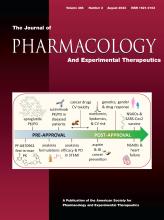This issue of the Journal of Pharmacology and Experimental Therapeutics hosts a Special Section on Clinical Pharmacology, a discipline exploring all aspects of the interactions between drugs and humans. There are eleven articles in this section, focusing on topics relevant to pre-approval drug development and post-approval research.
The first article in the pre-approval drug development segment provides pharmacodynamic (PD) and first-in-human pharmacokinetic (PK) characterizations of PF-6870961, major hydroxymetabolite of an antagonist/inverse agonist of the growth hormone secretagogue receptor, PF-5190457, currently developed to treat alcohol use disorders (Deschaine et al., 2023). The second article shows that the PK/PD profile of apraglutide, currently developed as a glucagon-like peptide-2 analog, holds promise for restoring intestinal mass in patients with intestinal failure secondary to short bowel syndrome or graft-versus-host disease (Bolognani et al., 2023). The third article shows that the safety and biologic effects of anakinra, an interleukin-1 receptor antagonist approved for treatment of rheumatoid arthritis and other autoinflammatory diseases, are independent of whether anakinra is administered in commercially available prefilled glass syringes or transferred into plastic polycarbonate syringes (Talasaz et al., 2023). This finding will help to design placebo-controlled double-blind randomized clinical trials of anakinra in other diseases characterized by systemic inflammation. The fourth article characterizes population PK and PK/PD models of weight-adjusted dosages of sutimlimab, an anti C1s antibody, in patients diagnosed with hemolytic anemia due to cold agglutinin disease. Sutimlimab is already approved for this indication but the new PK and PK/PD information may guide its evaluation in phase 3 clinical studies of other complement-mediated diseases (Frank et al., 2023). The fifth article shows that anakinra prevents new onset heart failure and death in patients with ST elevation myocardial infarction (STEMI). The paper also shows that anakinra mitigation of systemic inflammation in STEMI is evidenced by reduced plasma exposure to high sensitive C-reactive protein, a surrogate marker of IL-1 pro-inflammatory actions (Del Buono et al., 2023). The sixth article cuts across drug development and post-approval pharmacovigilance, providing a mechanism-guided review of the potential pitfalls in the adjudication of cardiovascular toxicities of new cancer drugs (Ewer et al., 2023).
Five other articles in this Special Section describe clinical pharmacology research in post-approval settings, with two articles fitting in the rapidly expanding area of drug repurposing. In the first article, type 2 diabetic patients treated with metformin showed reduced plasma levels of lipid metabolites known to associate with cardiovascular disease risk. Inasmuch as lipidome changes were independent of glycemic control and pre-existing cardiovascular risk, these results suggested that an old drug such as metformin might represent a new cardioprotective agent (Wancewicz et al., 2023). In the second “drug repurposing” article the venerable aspirin, unparalleled game changer in cardiovascular prevention, is reviewed for mechanisms and clinical evidence of preventive effects against colorectal cancer and other cancers of the digestive tract, something that could only be reconciled with the seemingly unlimited ramifications of aspirin-dependent inhibition of cyclooxygenases (Patrono, 2023).
The last three articles show what the clinical pharmacologist can do for optimizing the risk:benefit ratio of approved drugs. Genetic and gender inter-individual variability in response to numerous drugs, from cardiovascular agents to analgesics and cancer chemotherapeutics, are reviewed with respect to risk of overt toxicity or treatment failure but also with respect to opportunities for personalized changes of drug regimens (Cecchin et al., 2023). The next article on risk:benefit ratio focuses on nonsteroidal anti-inflammatory drugs (NSAIDs) as relievers of the SARS-CoV-2 vaccine adverse effects and the concerns around NSAIDs interfering with the immune response. Immunophenotypic, proteomic and metabolomic characterizations of a small series of vaccinated subjects show there is an NSAID-independent immune response to be further explored in properly designed clinical trials (Skarke et al., 2023). The last article too focuses on NSAIDs and characterizes their association with in-hospital death of patients with decompensated heart failure, whereas the same effects cannot be firmly documented for other drugs reportedly contraindicated in heart failure (Parish et al., 2023).
In summary, this Special Section on Clinical Pharmacology highlights how important this discipline can be for human health, contributing to both drug development and post-approval investigations on new therapeutic indications or optimization of existing therapies.
Footnotes
- Received May 9, 2023.
- Accepted May 25, 2023.
- Copyright © 2023 by The American Society for Pharmacology and Experimental Therapeutics






